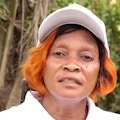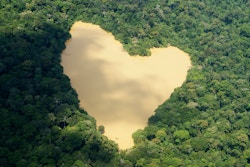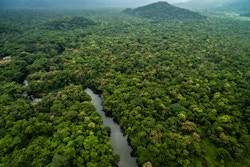
The Community Fund for Forests
Empowering Indigenous communities to protect the Congolese rainforest
The Community Fund for Forests is a groundbreaking initiative designed to empower Indigenous peoples and local communities to protect the vast rainforests of the Democratic Republic of the Congo.
CARBON SINK: The Congolese rainforest is the second largest rainforest in the world and the largest carbon sink. Photo: Alexis Huguet/RFN

Funding opportunities
- The Community Fund for Forests represents a pioneering approach to forest conservation and community empowerment in the Democratic Republic of Congo. We invite donors, partners, and stakeholders to join us in this ambitious endeavor. Your support will be crucial in preserving one of the world’s most vital ecosystems and fostering sustainable development for Indigenous peoples and local communities who depend on it. The consolidation phase of the Community Fund for Forests will start in 2025.
- Current donors: Bezos Earth Fund
During a crisis, you’d typically like the most competent people in the room to provide the solution.
With climate funding, that is often not the case. Studies show that less than one percent of global climate funds end up in the hands of local and Indigenous communities. For rainforest preservation, this means missing out on unique opportunities, as these communities are highly efficient conservators of their own homes, the forests.
When put in charge of forestry, local and Indigenous efforts yield higher biodiversity and less deforestation than projects based on external approaches. However, the voices of these communities are often the last to be heard – if at all – and important projects are stymied due to lack of funds.
The Community Fund for Forests is a pioneering initiative to rectify this. Located in the Democratic Republic of the Congo (DRC), it provides a local organizing hub to directly administer funding where it is needed the most, in a part of the world that we all depend upon.

LOCAL: A group of women from the village of Penzele in the DRC attend a meeting to talk about securing their forest in 2019. The Community Fund for Forests will work to preserve high-integrity forests via protection and Indigenous and community land tenure-mechanisms. Photo: Alexis Huguet/RFN

What is the Community Fund for Forests?
Established in 2023 by Rainforest Foundation Norway and the Wildlife Conservation Society, the Community Fund for Forests (CFF) aims to strengthen Indigenous people's and local communities’ capacity to receive and manage international climate funds to;
- Promote biodiversity conservation: Contribute to the 30x30 target of protecting 30% of land and sea areas by 2030.
- Mitigate climate change: Support the role of forests as carbon sinks.
- Foster sustainable development: Promote socio-economic development through sustainable forest management.
The initiative leverages recent policy advances in The Democratic Republic of the Congo (DRC) that recognize the rights of Indigenous peoples and forest communities and their crucial role in forest protection. The Community Fund for Forests aims to create a more sustainable and equitable future for people and forests in the DRC by providing direct funding and technical assistance.

INDIGENOUS: An Indigenous village in the Ituri rainforest in DRC. Photo: Johan Wildhagen/RFN

The Community Fund for Forests will:
- Increase Indigenous peoples' and local communities' participation in managing protected areas within their territories. This includes training, technical assistance, and support for community-based monitoring.
- Support civil society organizations in their efforts to engage with government authorities at the provincial and national levels on land-use planning and decision-making. This includes providing training, legal assistance, and advocacy support.
To achieve significant and long-lasting impacts, the support will be focused on communities and organizations located in and around especially biologically diverse forest areas (so-called high-integrity forests). The model is scalable, and through proper anchoring and commitment from the local stakeholders, the projects are well-positioned to expand their impact rapidly. The implementation of the project will start in 2025.
A massive carbon sink
The vast tropical forests of The Congo Basin are rapidly declining through clearance and degradation. Maintaining their extent and ecological integrity is essential for climate-resilient development, and to secure their carbon stocks and other ecosystem services. The rainforest in The Congo Basin is the world's largest carbon sink, of which 62 % is located in The Democratic Republic of the Congo. Absorbing 1.5 billion tons of CO2 every year, its preservation is closely linked to the health of our global climate.

We are happy with the Community Fund for Forests, because it involves Indigenous peoples and local communities in the decision-making.
Regine Mboyo Loloko, Indigenous leader, DGPA
Rethinking climate funding
The Community Fund for Forests differs from the current model in one crucial point. It will catalyze protection and better management of the remaining large blocks of high-integrity forest in DRC in a sustainable and highly cost-effective way by securing forest-dependent peoples' land and resource rights and addressing their development needs.
Indigenous and local community groups will play a central and leading role in the Forest Fund's governance. The fund will be set up to ensure that climate funding is channeled to local groups in a direct and cost-effective way.

FOREST MANAGEMENT: A representative from a Rainforest Foundation Norway partner and members of a local community meet to plan local forest management in 2014. Photo: Julie Forchhammer/RFN
With significant seed funding from the Bezos Earth Fund, Rainforest Foundation Norway will incubate the Community Fund for Forests by providing guidance and technical support to help establish a robust and autonomous institution. The financial support will be given to Indigenous and local communities, civil society organizations, and research institutes. Groups usually unable to receive funding from existing donors will be prioritized.
Smaller grants will support community-based activities that enhance local development and ensure forest preservation. The Community Fund for Forests will encourage and empower local and indigenous community ownership and initiatives through a decentralized structure and flexible financial support. It demonstrates how community-based rainforest management can contribute to economic development and poverty alleviation. These experiences of successful community strategies will be shared among NGOs, authorities, and donors.
For more information, contact:

Nicolas Delaunay
External Relations Director
(+47) 457 39 480
nicolas@rainforest.no

Kevin Sasia
Forest For Life Senior Programme Manager, DRC
kevin@rainforest.no








